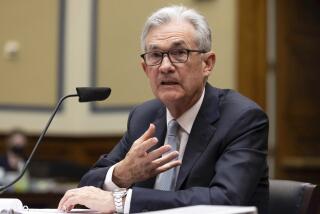CBO: Accepting ‘fiscal cliff’ would accelerate economic downturn
WASHINGTON -- The Congressional Budget Office issued new dire projections for the U.S. economy on Wednesday, warning that if lawmakers failed to act, the large-scale fiscal tightening set to occur next year will push the nation into a deeper downturn than previously thought and cause the unemployment rate to jump back up to about 9%.
The nonpartisan CBO, in its semi-annual budget outlook, forecast that the economy would shrink 0.5% next year if lawmakers failed to avert the so-called fiscal cliff and allowed expiring tax cuts, mandatory spending reductions and other policy changes to take effect in January.
Previously, the agency projected that economic output would contract in the first half of next year, probably sending the nation into recession, but still manage to grow 0.5% for the year.
The new outlook says the unemployment rate would rise to 9.1% by the end of 2013, up from 8.2% forecast for the fourth quarter of this year. The latest actual jobless figure was 8.3% in July.
On the other hand, with higher taxes, broad federal spending cuts as well as the end of the payroll tax holiday, the nation’s budget picture would look significantly better next year. If Congress did nothing, the CBO said, the deficit will fall to $641 billion in fiscal 2013, which begins Oct. 1. That would be down substantially from a deficit of $1.1 trillion now seen for the current fiscal year.
The nation’s deficit has exceeded $1 trillion for four straight years, and the accumulated federal debt held by the public this year will reach 73% of the nation’s gross domestic product, or the total value of the goods and services produced, according to the CBO. That’s the highest level since 1950, the office said, and about double the debt-to-GDP ratio at the end of 2007 before the deep recession.
Predictably, the updated budget and economic outlook added fuel to the election-year battle over government policies on spending and taxes.
President Obama and many congressional Democrats lawmakers want to let the tax cuts enacted under President George W. Bush expire for wealthier Americans to bring down deficits, while Republicans want to keep all tax rates low, saying increased taxes for high-income households would hurt the economy.
ALSO:
Fed Chairman Ben Bernanke warns of ‘fiscal cliff’ risks
Rising U.S. debt could trigger a downturn, agency warns
More to Read
Inside the business of entertainment
The Wide Shot brings you news, analysis and insights on everything from streaming wars to production — and what it all means for the future.
You may occasionally receive promotional content from the Los Angeles Times.











